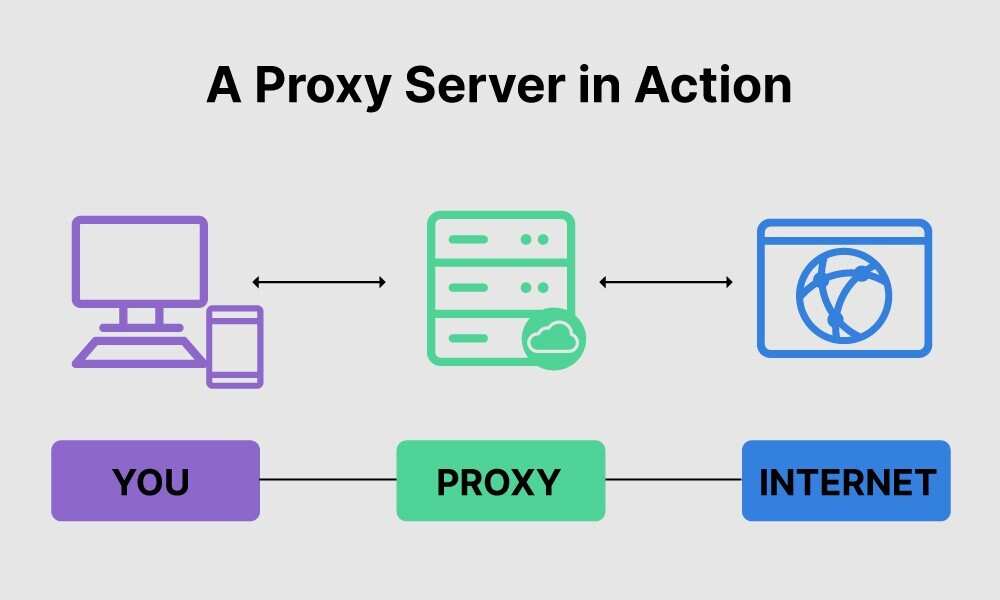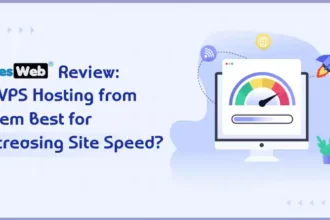In this article, we’re going to see what is a proxy server, and how does it actually work? Proxy server the topic is related to the industry, so if you’re interested in information technology, this article will give you a clear idea about proxy servers.
Definition of Proxy Server
The term proxy refers to acting on behalf of another it’s like a middleman for example you may hear proxy votes in the UK voting system if a UK voter cannot go for voting someone else will vote for you a proxy server is like someone who votes for the actual voter in the same way a proxy server retrieves data from the internet on behalf of its user.

How Does A Proxy Server Works?

Imagine your computer’s IP address is 122.100.20.44, and you want to browse a web page hosted on a web server the IP address of that web server is 69.197.6.3 the following incident happens when you browse the web application open a web browser type the IP address 69.19 on the address bar and press enter your browser requests the required information about the expected web page and the information will be sent to the web browser the web server recognizes the request by IP address 122.100.20.44 and responds according to the given request at last chrome received the information from the web server 69.197.6.3, and you can see your expected web page on your web browse.
What Unwanted Scenario May Happens To You?
The attacker can take control of communication between two users, government can easily monitor your activities over the internet and your privacy is compromised, when you have a big organization with several employees you cannot control their activities on the internet the web server will be down when more than the actual capacity of users will try to hit the website at once.
Today we will try to find solutions to these questions in this article you can solve these kinds of problems using proxy servers imagine you’re connected to a proxy server and the proxy server is positioned between you and your requested web server suppose the IP address of the proxy server is 31.255.112.89 now what will happen when you browse the internet you generate a request to the web server 69.197.6.3 from your computer one 122.100.20.44 the proxy server 31.255.112.89 receives the request from your device 122.100.20.44 now the proxy server hides your IP address and uses its static IP address 31.255.112.89 to forward the request to the targeted server 69.197.6.3 therefore your IP address is unknown to the web server because actually the proxy server 31.255.112.89 contacts the web server 69.197.6.3 not your computer 122.100.20.
Finally, the web server 69.197.6.3 sends the data to the proxy server 31.255.112.89 not to you 0.122.100.20.44 and your computer 122.100.20.44 receives those data from the proxy server 31.255.112.89, so again the web server cannot recognize you because it cannot connect to you directly that’s how your IP address will not be exposed on the internet now the information is stored in the cache memory of the proxy server 31.255.112.89 automatically after some time suppose another user 122.100.20.45 who is connected to the same network tries to access the server 69.197.6.3 it will send the request to the proxy server 31.255.112.89 before hitting the web servers 69.197.6.3 the proxy server 31.255.112.89 will check its cache memory first whether the data is available or not, and it can find the required data now the proxy server 31.255.112.89 will deliver those data to the user 112.100.20.45 from its cache memory without sending the request to the web server 69.197.6.3.
How To Use Proxy Server?
For personal use operating systems like windows provides the setting option for proxy servers personal computer users only need the proxy server’s IP address and port number given by the proxy server provider in addition some proxy server providers provide startup scripts to their clients a user needs to copy and paste the script address on the specific settings location for organization a big business organization usually maintains its own it infrastructure some companies set up their own proxy server which may cost more however many organizations take the proxy server service from cloud-based companies like Amazon the company purchases the desired proxy server service plan the proxy service provider then gives the credential to set up and maintain the proxy server generally the system admin of the company can manage and control the proxy server.
Reason To Use Proxy Server
(1) Privacy
Since the proxy server hides your IP address you can anonymously browse the internet, it keeps your privacy.
(2) Performance
Having cache memory, proxy servers, increase your browsing speed and save bandwidth.
(3) Access Blocked Content
The proxy shifts your geographical location online, altering your IP address, therefore you can possibly bypass content restrictions you can also use a proxy to bypass content blocks on your network.
(4) Activity Control
Proxy servers enable user authentication you will validly monitor your users the proxy server keeps all the track records of all the users connected to it. It keeps records of which user visits to which website and for how long, you can also block specific websites to keep users away from them.
Disadvantages of Proxy Server
(1) Misuse Information
Misuse information proxy servers are a centralized cache database to store data, so it can remember any credential information like username or password, so users under proxy servers can misuse the information.
(2) Costly
Installation and maintenance are expensive, including setup, there are various incidental costs.
(3) Security
Your data cannot be encrypted via the proxy server which is a huge disadvantage the government internet service provider or hackers can intercept or interrupt your data in this scenario VPN or virtual private network comes in, VPN not only encrypts your data but also hides your IP address as well.
Types of Proxy Server
There are various types of proxy servers based on location, traffic flow and amenity level, application service and IP address, but these are the most common:
- Forward Proxy Server
- Reverse Proxy Server
- Web Proxy Server
- Anonymous Proxy Server
- DNS Proxy Server














